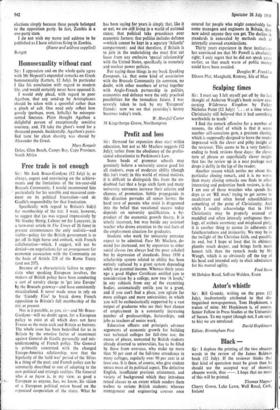Free trade is not enough
Sir: Mr Jock Bruce-Gardyne (12 July) is, as always, cogent and convincing on the achieve- ments and the limitations of the ten-year-old Brussels Community. I would recommend him particularly for his sensible and measured com- ment on its political frustration—and de Gaulle's responsibility for that frustration.
Specifically with regard to Britain's bid(s) for membership of the EEC. I want, however, to suggest that (as was argued impressively by Mr Stanley Henig, Labour hiP for Lancaster, in a turn-over article in The Times of 26 June) in present circumstances the only realistic—and viable—policy for the British government is to get off its high horse and embark, with French collaboration—which, I suggest, will not be denied—on negotiations for an arrangement for economic association with the Community on the basis of Article 238 of the Rome Treaty (and not 237).
Because of a characteristic failure to appre- ciate what speaking European involves, the makers of British policy have been conducting a sort of cavalry charge to 'get into Europe' by the Brussels gateway—and have consistently miscalculated. It never made sense to rely on the 'friendly Five' to break down French opposition to Britain's full membership of the EEC at present.
Nor is it possible, as you, sir—and Mr Bruce- Gardyne—will no doubt agree, for a European policy to exist at all which does not have France as the main arch and Britain as buttress. The whole issue has been bedeviled for us in Britain by the emotive factor of resentment against General de Gaulle personally and mis- understanding of French policy. The General is primarily concerned with the changed Europe-America relationship, now that the bipolarity of the 'cold war' period of the 'fifties is a thing of the past; and French policy can be summarily described as one of adapting to the new political and strategic realities. The General who a sa facon is, in my view, as good a European as anyone, has, we know, his vision of a European political union based on the organised cooperation of the states. What he has been saying for years is simply that, like it or not, we are stDI living in a world of national states; that political take precedence over economic factors; that politics includes defence —which cannot be kept in a separate 'Atlantic' compartment: and that therefore, if Britain is to join in the undertaking she must first cut loose from any exclusive 'special relationship' with the United States, specifically in monetary and nuclear power policies.
For saying these things in my book Speaking European, i.e. that some kind of association with the Brussels Community (in common, no doubt, with other members of EFTA) together with Anglo-French partnership in politics, economics and defence were the 'only practical possibilities for the immediate future, I was severely taken to task by my 'European' friends: now we see that yesterday's heresy becomes today's truth.






































 Previous page
Previous page